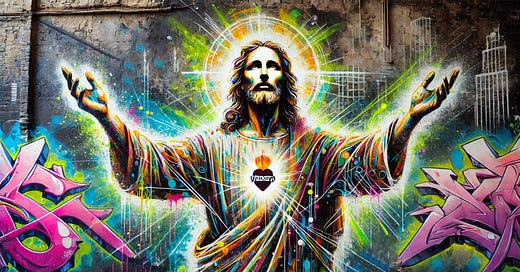Christianity isn't about morality, politics or culture wars. It's about a person.
It's about the one who said, "I am the resurrection and the life."
This sermon was given by the Rev. David Libbon at Good Shepherd Anglican Church in Cornelius, North Carolina, on March 16, 2025.
You can view the sermon here, starting 23 minutes into the service.
The text for today was John 11:17-44.
Click here to read what I wrote about Jesus’ seven “I Am” statements, which Pastor David is preaching about during Lent.
Click here to read about the first “I Am” statement: “I am the Good Shepherd.”
When talking about Christianity with non-believers — or even those who claim the faith in name only — their objections usually center on hot-button issues.
They question biblical teachings on topics like gay marriage or women’s roles in the church, struggle with the perceived harshness of God in the Old Testament (or Revelation), or reject Christianity based on how some believers act or vote. Many see it as a set of rules, or a moral code, or a political movement. Others wrestle with the church’s history, citing hypocrisy, past injustices or division.
But here’s the thing — Christianity isn’t about any of those things.
Christianity isn’t about morality, politics, culture wars, or whether we think God’s ways are fair.
Christianity is about Jesus.
It’s about who He is — the Creator, Savior, and King of the universe.
Jesus makes this clear in John 11:25, when He tells his friend Martha:
“I am the resurrection and the life. Whoever believes in me, though he die, yet shall he live, and everyone who lives and believes in me shall never die.”
At the heart of Christianity isn’t a debate. It’s a person. And His name is Jesus.
Pastor David drove that point home Sunday in his sermon on how Jesus raised Martha’s brother, Lazarus, from the dead.
David said:
“The gurus and philosophers of this world point away from themselves. They point to some experience. They point to some philosophy. They point to a great, grand metaphor that governs life.
“Jesus points to himself. ‘I am the resurrection. I am the life.’”
It’s one of the seven “I Am” statements that Jesus makes about himself in the Gospel of John.
The story of Lazarus being raised from the dead in John 11:17-44 is significant for several key reasons:
Jesus’ Power Over Death — This miracle demonstrates that Jesus has complete authority over life and death, foreshadowing His own resurrection and proving He is the “resurrection and the life.”
Revealing Jesus’ Divinity — By raising Lazarus after four days, Jesus shows He is more than a teacher or prophet. He is the Son of God, with divine power.
A Preview of the Resurrection — Lazarus’ resurrection points to the ultimate hope of believers: eternal life through Christ. It reassures Christians that death is not the end for those who trust in Him.
Jesus’ Compassion — The shortest verse in the Bible, “Jesus wept” (John 11:35), reveals His deep love and empathy for His friends and humanity. Even though He knew He would raise Lazarus, He still grieved with Mary and Martha.
The Final Sign Before the Cross — This miracle directly leads to Jesus’ arrest and crucifixion. The Jewish leaders saw His growing influence as a threat and began plotting His death (John 11:53).
Pastor David’s teaching on verses 41-42 stood out to me. Here, Jesus prays to God the Father just before raising Lazarus — surrounded by mourning onlookers and moments after He Himself wept over His friends’ pain. The scene reveals both Jesus’ deep compassion and His divine authority.
“And Jesus lifted up his eyes and said, ‘Father, I thank you that you have heard me. I knew that you always hear me, but I said this on account of the people standing around, that they may believe that you sent me.’”
David noted that this is a prayer of thanksgiving — not a prayer of petition or intercession.
David continued:
“What if we as Christians became known as the kind of people who — even in the midst of pain, in the midst of grief, in the midst of sorrow, in the midst of loss or of suffering — we were able to worship and give thanks to God, trusting in the goodness of his plan, even if at that moment it seems like folly?”
The pastor finished with an application, noting that after Lazarus came out of the tomb wrapped in linen strips, Jesus told his disciples to “Unbind him and let him go.”
David emphasized that we need each other to shed the grave clothes that bind our faith, helping one another walk in the freedom Christ offers.
“Is it time to start rolling some stones and taking off some grave clothes?
“One theologian says, ‘There is no higher privilege this side of heaven than for us to be used of the Lord in the rolling away of gravestones and the removal of grave clothes.’
“What is standing in the way of our friends and our neighbors and our coworkers hearing the Gospel of our Lord? What is wrapped around our brothers and sisters that is tripping them — that is strangling the life from them?
“We called to stand with them, to remove one another’s burdens, to pray for one another, and to love one another. What would it look like for you this week to stand in that place, to have that conversation, to offer that invitation?
“Jesus said, ‘I am the resurrection and the life. Do you believe?’”




